Photo: David Becker / Stringer
There were many bad omens foretelling the demise of Jeb Bush’s laughably ineffectual run for the White House. There was his his confusion about his position on the invasion of Iraq, his awkward performances in the debates. “Please clap.” That desperate gun tweet. On top of all those real life failings, he also got thrashed in a video game simulation of the campaign.
The game in question is The Political Machine 2016, the fourth in a series of simulation computer games that debuted during the 2004 Bush vs. Kerry campaign. Among people who played out the 2016 presidential campaign, Jeb Bush was the winning candidate only 0.8% of the time. That’s a little better than Ben Carson (0.6%), so there’s that. But players won the virtual White House more frequently with Ted Cruz (1.9%), Marco Rubio (2%) and Hillary Clinton (5%). They won significantly more with Bernie Sanders (13.2%) and Donald Trump (13.8%).
Bush was either an ineffective character or an unpopular choice that players didn’t even bother to commandeer through the simulation. It was probably a bit of both. The former Florida governor might be pleased to know that the most successful candidate for people playing this game has been “Custom Candidate” (43.9%). But among the pre-set candidates programmed by the game’s developers at Michigan-based independent studio Stardock, Bush was less successful than virtual versions of Chris Christie, Al Gore and even Michelle Obama.
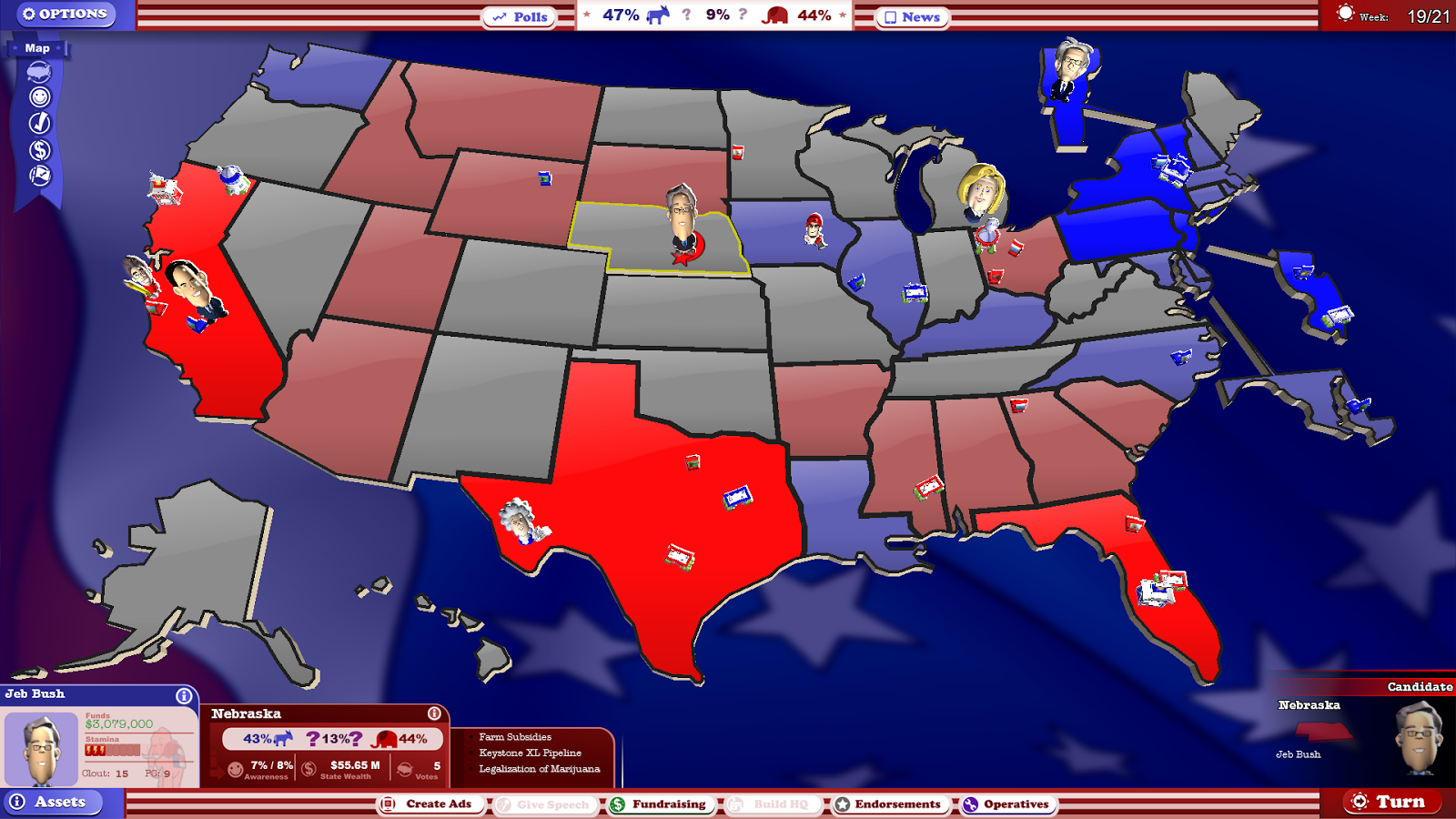
In one session of the game, we miraculously won California for Bush, with help from running mate Rubio. A Clinton-Sanders ticket cleaned up in the northeast.
The Political Machine isn’t a crystal ball. It’s not science, either, so don’t go expecting Trump to narrowly edge out Sanders in the general election. It’s simply a game and, as an added benefit, an amusing exercise in quantifying the candidates and clowns running for President. It turns candidates into strategy game characters by putting numbers on a variety of otherwise unmeasurable qualities such as credibility, experience and media bias. You pick the candidate, check their stats and see how far you can take them.
Here are Bush’s stats in the game, each crunched on a scale of one to 10:
Jeb Bush
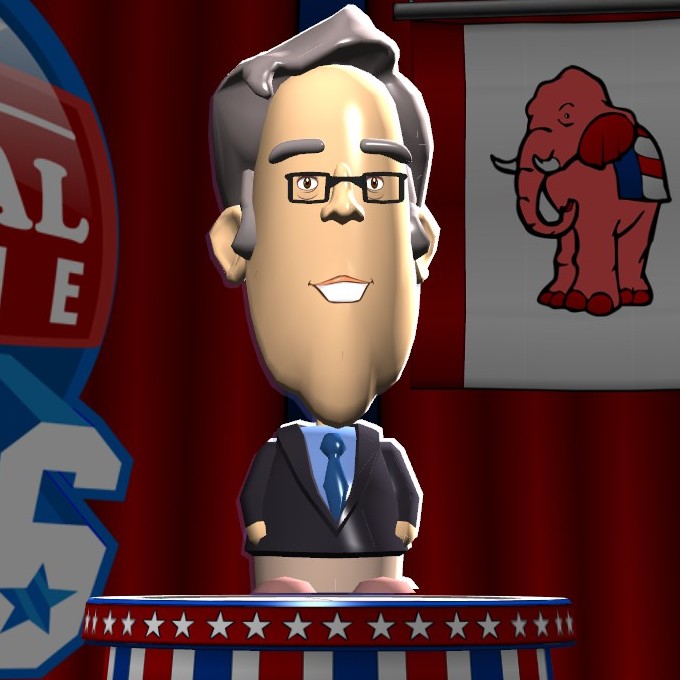
Stamina – 4
Money – 6
Fund Raising Ability – 7
Charisma – 5
Appearance – 5
Credibility – 5
Experience – 6
Intelligence – 4
Media Bias – 7
Minority Appeal – 5
Religious – 7
Some of those categories are self-explanatory, others pretty video gamey. Stamina, for example, affects how many actions a candidate can take per turn in the game. In each turn, Bush or whoever else is on the ticket uses their Stamina points to fly from state to state, give speeches, run ads and so on.
Appearance is a measure of how effective the candidate is during interviews with the game’s version of 60 Minutes and The O’Reilly Factor. A high Intelligence stat gives the candidate more possible answers in those interviews.
Credibility measures the effectiveness of the candidate’s negative ads and his or her ability to withstand any negative ads targeting them. Experience makes it easier to pick up endorsements.
Jeb Bush’s 6 for Money and 7 for Fund Raising Ability seem a little low and too similar to the other candidates’. He raised an absurd $US155.6 ($218) million as of January 31st, second out of all candidates to Hillary Clinton, according to a New York Times round-up. But that 5 for Charisma, the game’s measure of effectiveness in speeches and ads, feels more on target.
A high Media Bias stat is supposed to indicate that the media likes you and that the resulting coverage can sway independent voters. For this stat, The Political Machine‘s designers have had to game their own game and give Donald Trump a higher media bias stat to account for how the press’ disdain actually seems to help him. Bush’s 7 in the Media Bias category feels right in that the press pegged him as a presumed front-runner early on, even though he wasn’t. All that bias just didn’t really amount to much.
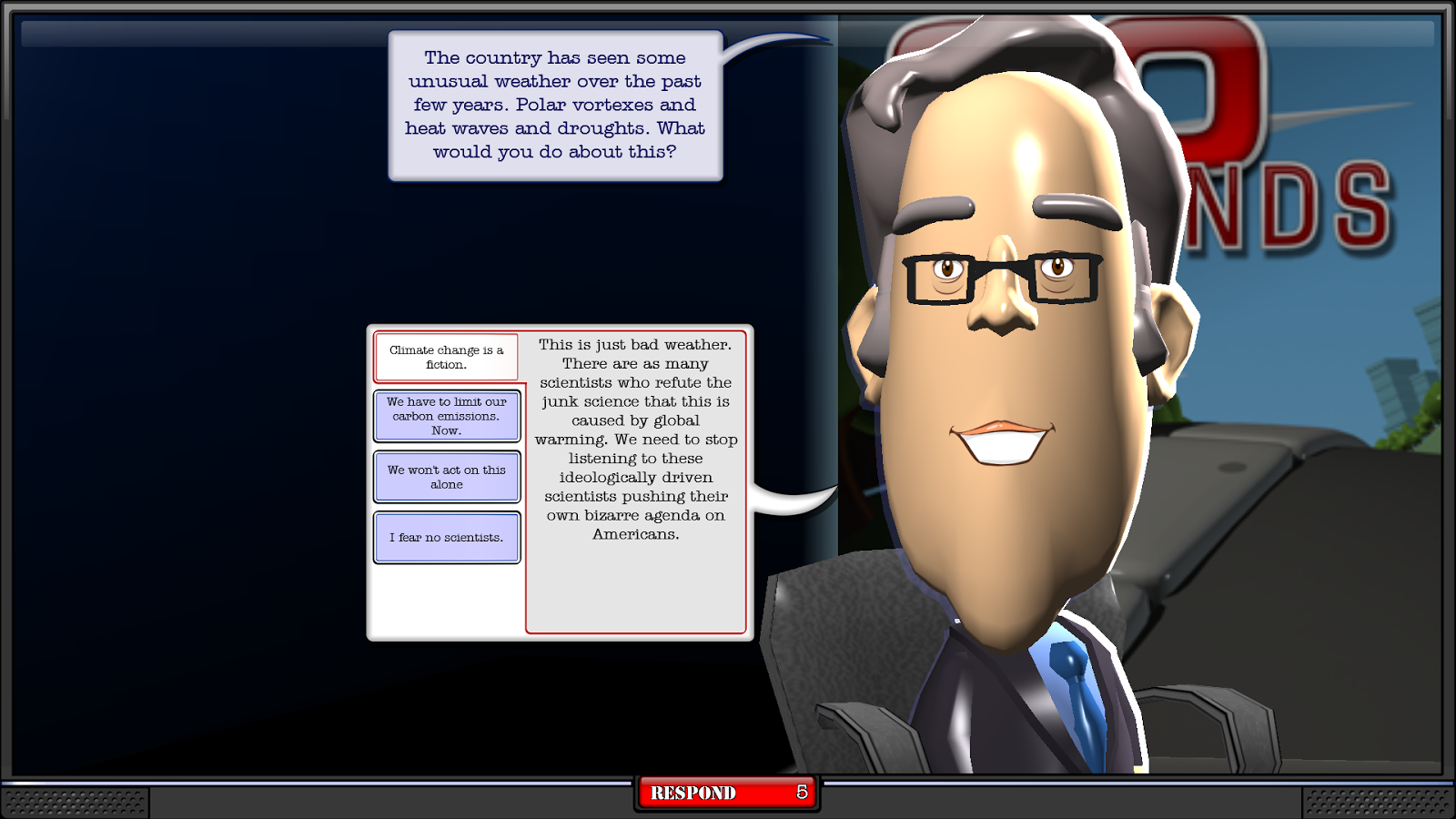
Stardock calculates the politicians’ stats by researching news coverage and candidate bios. The numbers are also a product of “contentious” debate among the Political Machine‘s development team, according to Stardock founder, Brad Wardell. “Most of the [game’s] stats are largely uncontroversial,” he said. “Where it gets harder are things like Credibility, Charisma, Intelligence. We need those stats in the game in the same way we [a role-playing game] needs similar stats. But they’re obviously subjective.
“For example, we gave Jeb Bush a 4 on Intelligence, which affects what interview answers he has available, but a 7 on Religious, which makes him perform better in States with a large religious population. By contrast, we have Hillary Clinton a 7 on Intelligence but only a 3 on Religious. Does this mean we think Secretary Clinton is smarter than Governor Bush? Not necessarily. A lot of it comes down to trying to make the overall simulation more accurate.”
Nevertheless, the game puts Bush’s Intelligence a point below Trump’s, which is a point below Cruz’s.
Here are the stats for the candidates still active in the race, ready for you to debate them. Note that the developers say that stats need to be balanced out, so a high number in one category usually mean a low number elsewhere:
Ben Carson
Carson’s stats are middle-of-the road, but with high religious and intelligence.
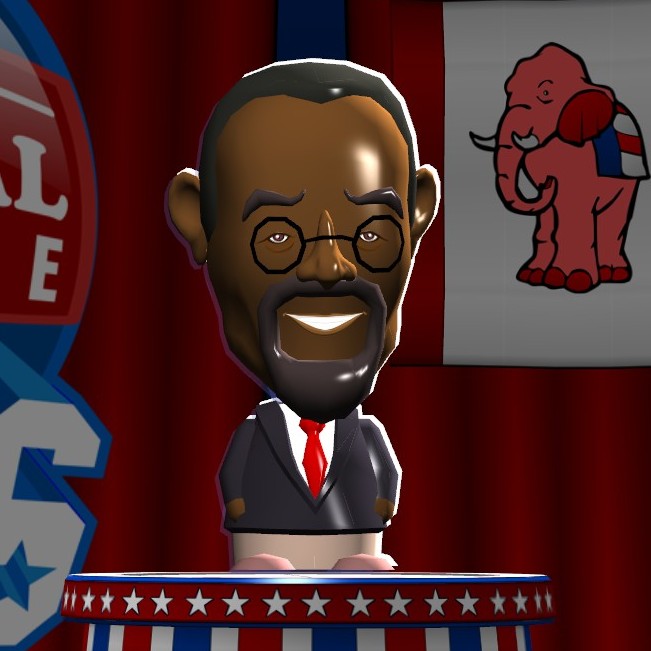
Stamina – 4
Money – 6
Fund Raising Ability – 6
Charisma – 6
Appearance – 4
Credibility – 6
Experience – 4
Intelligence – 7
Media Bias – 6
Minority Appeal – 6
Religious – 8
Bernie Sanders
The septuagenarian senator from Vermont has great charisma and credibility, but is near the bottom in appearance (that’s effectiveness during interviews) and ability to appeal to religious voters.
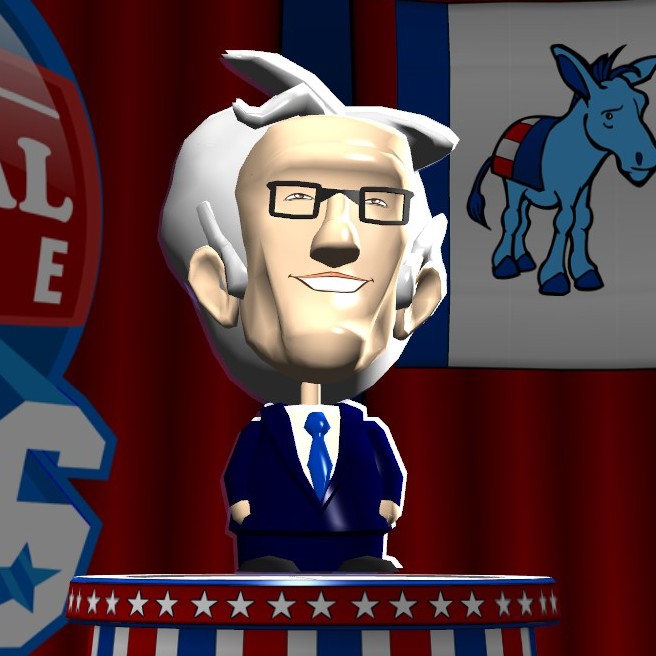
Stamina – 7
Money – 4
Fund Raising Ability – 7
Charisma – 9
Appearance – 2
Credibility – 9
Experience – 7
Intelligence – 7
Media Bias – 4
Minority Appeal – 4
Religious – 3
Donald Trump
Not surprisingly, Trump does great in the money categories, not so great in the categories relating to people who know not to say “Two Corinthians” or are not white.
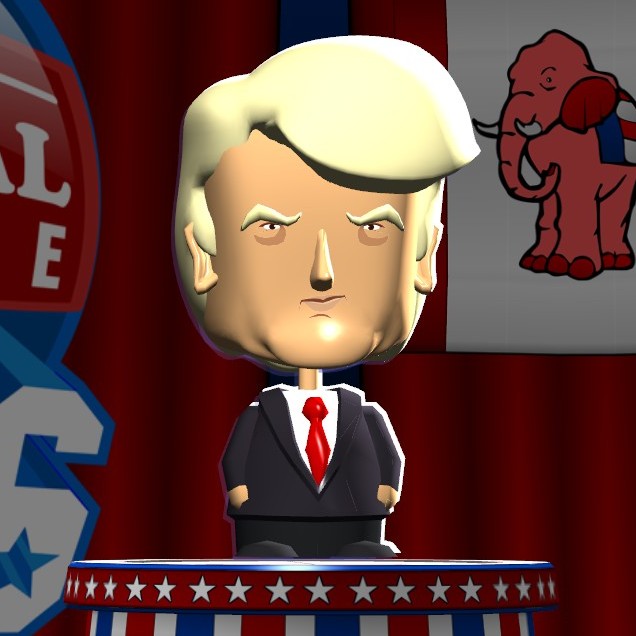
Stamina – 7
Money – 10
Fund Raising Ability – 8
Charisma – 8
Appearance – 5
Credibility – 3
Experience – 5
Intelligence – 5
Media Bias – 3
Minority Appeal – 1
Religious – 3
Hillary Clinton
The former Secretary of State is good at fund raising and garnering media attention, but gets low grades for credibility, go figure.
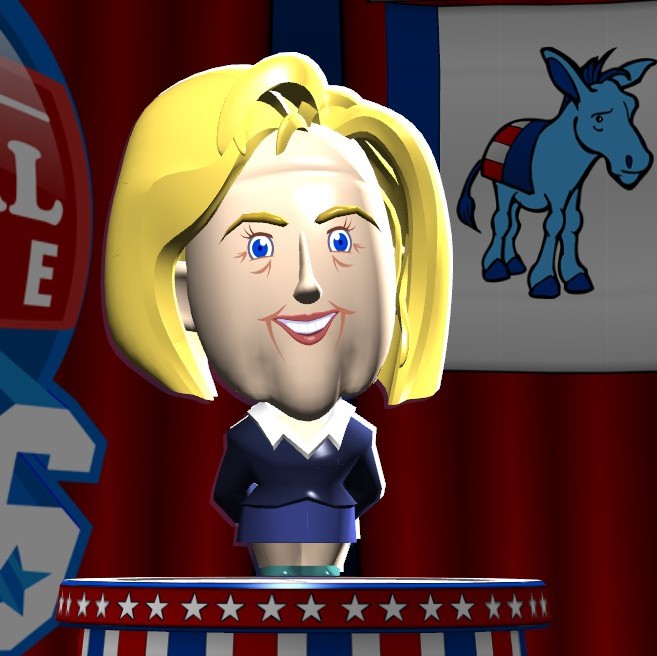
Stamina – 7
Money – 6
Fund Raising Ability – 9
Charisma – 6
Appearance – 5
Credibility – 3
Experience – 8
Intelligence – 7
Media Bias – 7
Minority Appeal – 5
Religious – 3
John Kasich
Unexciting stats for an unexciting candidate who would probably get a 10 if there was a category for reminding people that he was governor of Ohio.

Stamina – 7
Money – 6
Fund Raising Ability – 6
Charisma – 6
Appearance – 6
Credibility – 6
Experience – 6
Intelligence – 7
Media Bias – 4
Minority Appeal – 6
Religious – 6
Marco Rubio
Rubio’s numbers seem underachieving, which is fitting, but he’s got a solid combo of religious appeal, minority appeal and media appeal, which squares with reality.
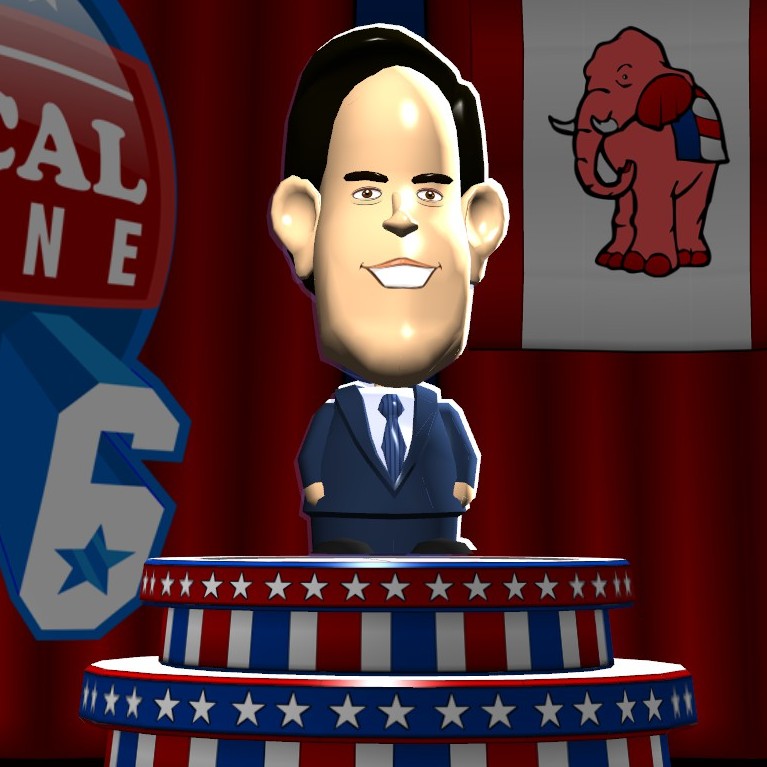
Stamina – 5
Money – 5
Fund Raising Ability – 7
Charisma – 6
Appearance – 5
Credibility – 6
Experience – 5
Intelligence – 5
Media Bias – 6
Minority Appeal – 6
Religious – 7
Ted Cruz
The Texas senator’s religious stat is appropriately high, but his fundraising ability looks a bit low. It certainly tracks that the media doesn’t like him.
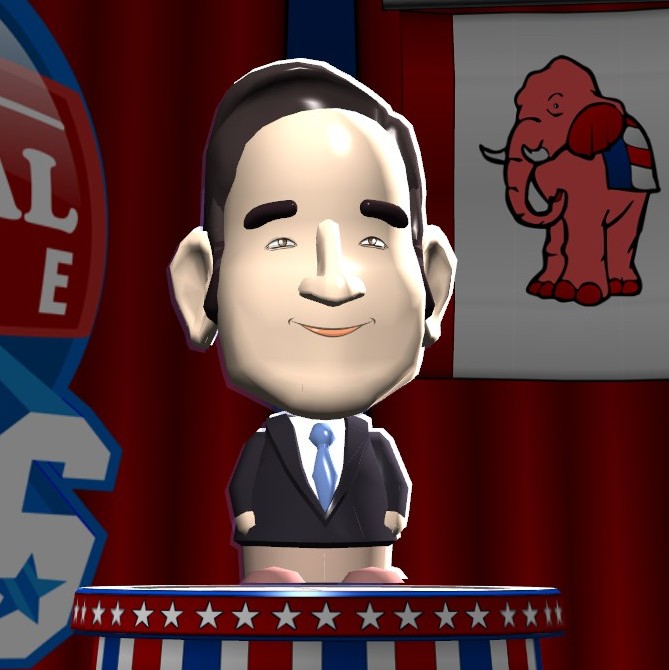
Stamina – 7
Money – 5
Fund Raising Ability – 3
Charisma – 5
Appearance – 5
Credibility – 5
Experience – 6
Intelligence – 6
Media Bias – 4
Minority Appeal – 3
Religious – 8
These numbers are derived by people, and people aren’t perfect. The Political Machine‘s creators say that, if anything, the game’s creators tip the scales away from candidates they personally like.
“We find that designers tend to bias against the party they support,” Stardock vice president Derek Paxton, who said that the series has been worked on by Democrats, Republicans and Independents. “We don’t know if they are overcorrecting for their personal bias or if they tend to place reasonable numbers for the candidates they are more familiar with and tend to be more extreme with the ones they aren’t familiar with. But, by having multiple different political ideologies in the process, we tend to come to a reasonable balance.”
That seems right. The game doesn’t appear to be weighted toward any chosen candidate. Stardock CEO Wardell, for example, had recently Tweeted about how he had favoured Carly Fiorina for President, but the now-former candidate’s stats in the game are largely unremarkable: Money 7, Charisma 5, Intelligence 6, Appearance 5, Experience 6 and so on.
In recent weeks, players have been using The Political Machine‘s candidates to run simulations of the election, which is where Bush’s paltry 0.8% success rate comes from. Trump gets the most wins of the named candidates, slightly more than Sanders, but Democrats score more victories in the general election, winning 55.5% of the time. Top issues, as tabulated on the game’s after-action stats site, are Fighting ISIS, Resettlement of Refugees and Securing The Borders.
With all these numbers at hand, Stardock boss Wardell noticed something telling in the player stats that the game collects and publicly displays: “based on the ladder rankings, players seem to think maximizing their Fund Raising Ability is the key to victory,” he said in an email. “I wonder what that says about our election system. :)”
Whatever it says, in the real world, raising $US155.6 ($218) million in the campaign didn’t do much for Jeb Bush. His other stats were just a bit too lacking.
stephentotilo@kotaku.com or find him on Twitter @stephentotilo.
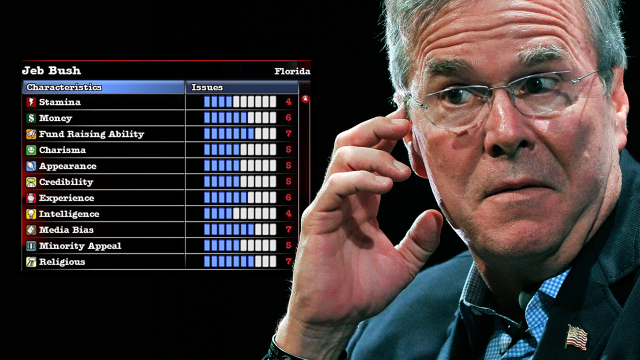
Comments
2 responses to “A Video Game’s Stats For The 2016 US Presidential Candidates”
Gotta say I would expect media bias to be much higher for Clinton and much much lower for Sanders
Played it – Pretty Fun!